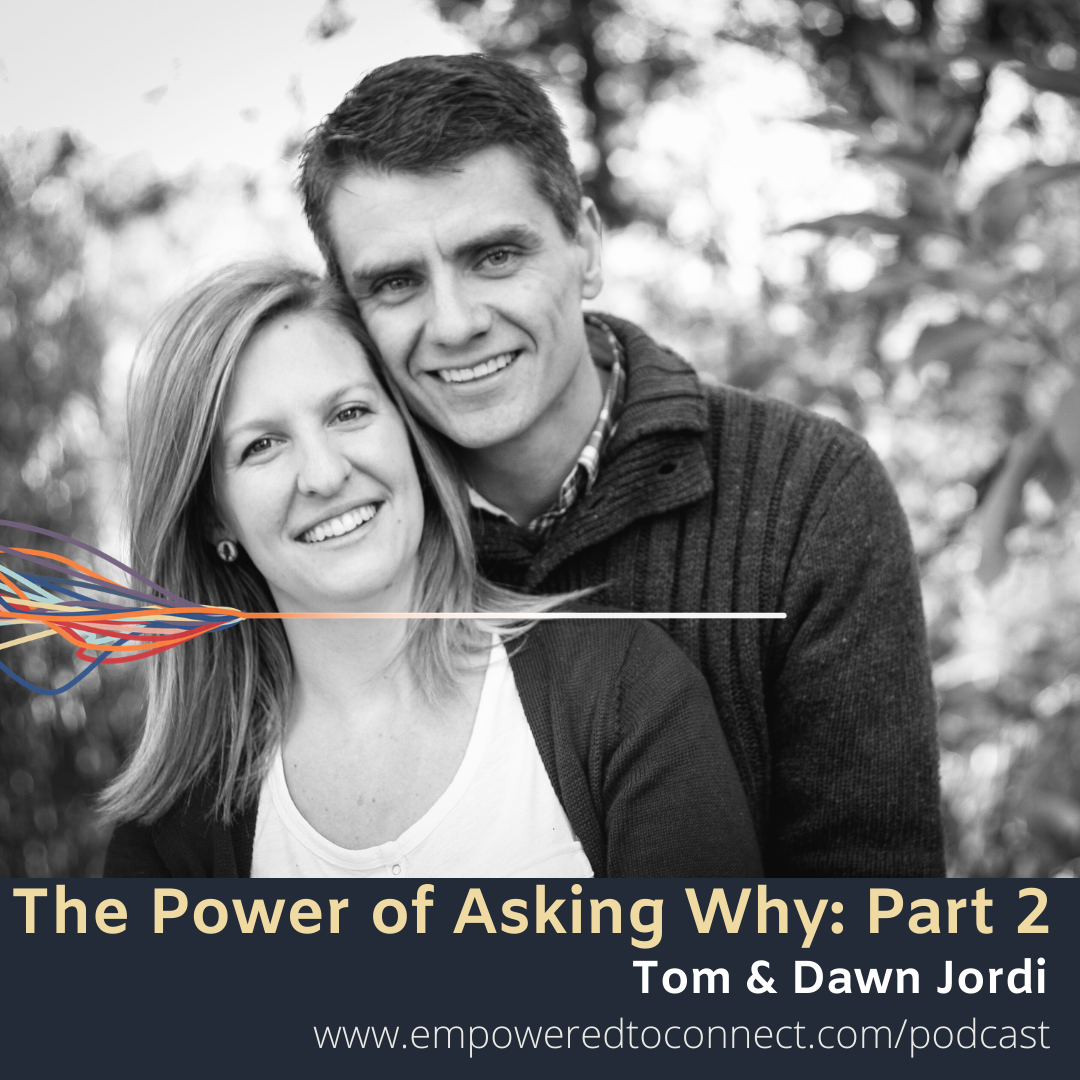Episode Transcript
[00:00:12] Speaker A: Welcome to Carpool Q A with Empower to Connect, where we give you something to get you from point A to point B. And so if you have listened to our podcast for any period of time, you know that our feed that drops on Tuesday usually is long form interviews and deeper dive discussions. And so we wanted to get quick hitting conversations about topics that we get asked about all the time, or, honestly, we have questions about ourselves. And so each week, Becca or Tana or myself will bring a question to the rest of the group that the others have not prepared for ahead of time, and we will just talk about it offhand. And so Tana Ottinger, senior Program Director for Empower to Connect, and Becca McKay, program Director of the Empower to Connect Institute, are here with me. And I'm JD. Wilson. And I'm your host. And so why don't we jump into our topic today. Tana, why don't you start us off?
[00:01:05] Speaker B: Okay. So excited to be doing this. So let's just jump right in. My question is, how do you handle, manage, support the, shall we say, like, meltdowns that happen around homework in the after school? Because I don't know about you all, but homework is amping up at my house, and we get this question all the time, so let's talk about homework.
[00:01:32] Speaker A: I mean, the easiest answer that I would have to that question is, let's not talk about homework because it's terrible.
[00:01:43] Speaker C: Probably not. Get your best noise canceling headphones and just pretend like you don't see it. That's probably not where we're going, right?
[00:01:50] Speaker B: Thomas yeah, I mean, I'll just say, you guys, at the end of last school year, I was, like, done. I was so done.
I don't think I was emotionally well because of homework.
I feel like it was like sucking the life out of me and our family.
It can just be a thing, right? It can be a thing.
[00:02:15] Speaker A: Well, the I mean, for me, I feel like one of the most difficult parts to balance of it is that so we have four kids. Tony, y'all have six. You have two, three still in two.
[00:02:27] Speaker B: Only two little loves doing homework this year, thank goodness.
Check. Check.
That's what I'm saying.
[00:02:36] Speaker A: And we range from kindergarten to Eigth grade. So it's not necessarily just the homework. For me personally, it is homework stacked on dance, baseball, cross country track, all the other activities. And so with each different kid, there's a different rhythm, right? So we have one kid that's got stuff going from 436, 30 every day after school, and so that child is not even sniffing homework until they are dead, exhausted, and tired from physical activity for two and a half hours after school. So that's its own challenge. And I think if we just had to go to school, do homework, and then just whatever, watch the office as a family and go to bed, that would not be a big deal to me. But it's adding it into the mix where every kid's got a different load of work, a different type of work. We're in algebra territory, which means that I'm out of my range in math now.
There's a difficulty in the individual what's the word I'm trying to figure out.
Everything has to be customized because there's not a system that works for everyone, because not everyone's even at the house at the same time.
[00:03:59] Speaker C: The other thing, too, is I've heard from so many people the homework takes ten minutes if they would just do it. But just the like you're saying, the exhaustion level, just the resistance that you get when you even just present.
I've got friends who have littles that are like you're saying kindergarten, they're just starting to do homework. And it might be something little like trace your name or trace these little shapes, or as you get older, it might be your pre algebra homework and you might get into your geometry and having to do proofs and all that. But it's also like, how do you create an environment where they're calm enough, where they're motivated enough to just kind of muscle through it after they've used so much of their energy at school during the transition home? So I think that's one of the big questions is just like, how do you bridge that gap? And I don't think, like you're saying, JD, that there's one answer. I think it depends on the family, depends on the kid. But I'm curious. Obviously it is not easy, but you all have done it with ten kids collectively. So what are some of the things that have worked?
[00:05:06] Speaker B: Yeah, it's funny, JD, because you're like, it would be easy if we just sort of did homework and that was it. Which is kind of our family dynamic. Our kids don't have a lot of after school stuff out of their own personal choice this year. And one of those is because one of our kids hyper fixates on academics, so opted out of some athletics so that they could have ample time to be relaxed and, let's say over study out of their own personal desire to like so I like what you're saying, Becca, because it really is so incredibly different for different kids. I mean, some kiddos can do homework independently and they're self motivated. Some deeply struggle and need you to sit present and consistent with them hand in hand. And so I hate to be a broken empowered to connect record here, but I think where I'm going to have to land on this one is know your kid and be curious. Like, hello, here we are, back to sort of the basics again, but really and truly know your kiddo and be curious and then set them up for success. Because you're right, JD, homework is happening in the middle of evening, which also includes, I hope, at some point they'll eat something and then I hope at some point they'll take a like, I hope those things are happening and know is happening at a reasonable hour. So I just feel like my intensity goes up because what happens to me when it's time to pick kids up from school is I feel the anxiety of the evening and how it might go creeping into me as well. I am sort of bracing for impact is how I feel. And it's not always horrible. I'm just saying, right. The mindset I shift into and how to set them up for success, whether that's food in the car, like they hop in the car and there's food, there's a cold bottle of water. I mean, what can we do? What can we do to get food in them as quick as possible and start the schedule for the evening and we run a fairly scheduled evening and like I said, they've opted out, which makes me sad, but that's just kind of where they are right now, is they know. One of them knows they need a lot of my help and the other knows they want to study a lot, a lot.
[00:07:39] Speaker A: I cannot relate to that desire. I wish I'd had more of that when I was growing up. I think for us, yes, that's the answer, unfortunately or not unfortunately. I mean, I think the beauty of it is that it does allow you to connect more with each of your kids. Now I am saying that and probably if you asked our kids, they would say, yeah, homework is some of the worst nights of our whole entire lives because we have had and I'm sure most of you listening have also had some epic homework meltdowns over the years because those stages changed, too. So what might have been easy for one kid in one phase of life with one specific teacher, they were really connected with that. They just kind of understood what to do and got on it. Or maybe that teacher helped them to feel zero pressure, so they just burned through it trying their best, but they weren't worried about failure or you have kids that care at different levels at different times.
[00:08:35] Speaker B: Right.
[00:08:37] Speaker A: But they each have individual needs.
And I'll say we always talk and we do see it in the itunes or the Apple podcast reviews that people are like, oh, they're just like us. They're normal people, which sometimes can be hurtful. How normal you think we are all the time.
[00:08:56] Speaker B: That's right. Do they have anything figured out? I don't know about that.
[00:09:01] Speaker A: In that story of just like to keep it real, it probably wasn't until late March, early April of last year that I felt like we got to a solution with everybody. Like we kind of had a lot of them figured out through the year. And I say kindergarten to eigth grade earlier.
It's first grade to eigth grade. That's how early in the school year. It is I don't even know what grade are in school, but it took us probably till April to get to a solution last year. And it came at the suggestion of a friend of ours who does happen to be a therapeutic professional, who was like, have you thought about just doing that? And when they made that suggestion, it was like, yeah, we're basically like loading pressure up on all the parties involved all the time. And then we're feeling shame and failure. They're feeling shame and failure if something slips through the cracks. And so instead it was like, let's set up a routine. Let's frame it as, hey, look, we are going to just make sure that this is a time where we're setting up good habits and we're going to do those habits together to just help get you going, drama to it, get your dinner set to the table and then we're just going to do it. We're going to sit there together. And a lot of nights if I had other work to work on, I just crack the computer open too and I just work right alongside that kid or scroll Twitter or whatever, watch football highlights or something. But I think all that to say, this is not something that just comes easy where you sit down for five minutes and you're like, oh, got it figured out. And it might change shapes throughout the course of the school year, even throughout different seasons where there's other stuff going on or there might be school presentations or programs going on that your kid has a speaking line in or whatever. So all that said, that the detective work you've got to do as a parent is just has our kid best thrive and succeed and how can we help them to build some habits out of that?
I was going to say cohabitation because it's cohabit making, cohabit making.
[00:11:06] Speaker B: Habits together.
[00:11:08] Speaker A: I was thinking co regulation, but yeah, totally. The habit of doing those things together eventually hopefully allows you to take your hand off the bike seat and let them pedal by themselves, right?
That would be the hope at least.
[00:11:23] Speaker C: I have so many different popping off in my head. And one of them is the way that you approach homework is going to impact your kid. So think about in the last three or four weeks, however long you've been in school, has it been kind of that fierceness to your tone? Is that the approach that you're taking to homework because you're just so frustrated? The other temptation for adults is just to jump in and do it for them because it's faster. It's always faster to do for your kids than to let them pedal the bike wobble a little bit, find their way forward and so building enough time in for those things. The other thing is just be willing to try different things.
Somebody that I know was having a lot of sibling conflict as soon as they walked in the door, and they figured out, if I let this kid, this specific kid go take a shower right after school, be by themselves, have that sensory experience before I make them do anything, the kid really enjoys that. They come out feeling better. They're a little more ready to talk about their day. They're not feeling so amped. So that's been helpful for some. For others, it's like, what's the order? Are you trying to get them from playing on the trampoline to sit down and do your math? Or like, you're saying, JD. Is it like, we're already sitting at the table doing dinner. Now we just pull out the homework when we're already seated. So I do think there's, like, if you can be creative about the order of events and how you're presenting it, and if you can try to see what the need is. Does your kid need some fun when they first see you? Do they need some calm? Do they need some structure, like, kind of figuring it out? And as they get older, you can ask them that question, hey, we've got to do homework this week. I want you to tell me, let's try it this way, this way, and this way, and let's see which one feels the best to us. Let me know. Like, just being kind of with them in that I don't know. Those are some of the things when you guys are talking that are popping in my head.
[00:13:18] Speaker B: I agree. And I think even knowing that you might have one family, but you have different kids yeah. Letting them sort of negotiate those needs and respond, like, if it were up to me, if my personality if I was meeting Tana's needs, I would see my kids, and we would go play, and we would do all the fun, and then we would knock homework out real quick. Like, that's what I would love to do, but that actually is not what one of my kids needs, because until homework is done, they can't relax.
They can't exhale until they've completed their work, and then they have hours of rest ahead. I would want to procrastinate the work and play for a bit or whatever. So I think it really is about maybe even changing your own personal preference and then something else that was popping in my head when I just think about meltdown.
If we're thinking about Kiddos who, it's not just about how to do it, but it's like, a kid that gets to homework and there's a meltdown. So one of our sort of questions for consideration is, is this just hard in the moment, or is this a skill that there's a deficit and they need some additional support? So if you're hitting homework and there's a meltdown, I would step back and say, I wonder if they could have used a really yummy meal and a snack and some water or physical activity first, and then this is something they can do. They're just struggling in the moment to do it.
Or is this something that is outside of their academic capacity and they need actual academic support? So think about what's happening and why is that meltdown? And then you can be creative around the support structures.
It's an easy question, like how to handle a meltdown. There's just one quick solution. There's an easy, okay, we solved that problem.
[00:15:16] Speaker A: Do it for them.
[00:15:18] Speaker B: Do it for them. Take away.
[00:15:21] Speaker A: Like, first grade homework.
[00:15:24] Speaker B: That's right. And maybe even the science project. No, I'm just teasing. I'm just teasing.
[00:15:30] Speaker A: Okay, well.
[00:15:34] Speaker B: Connection is the goal, and they might be in protection mode. So if they're in protection mode or stress or frustration or meltdown, how do you move them through that to support them and keep connection as the goal.
[00:15:49] Speaker A: Just don't give up. Like, if your first attempts at it are just bombing, that's fine. Just don't give up. Just keep trying different doors till you figure out the right one. And don't put that pressure on yourself that you got to figure it out in X number of tries. Like, you all are just working together as a team to get it figured out.
Yeah, that's it. All right. Well, guys, thanks.


